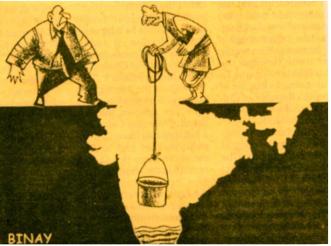/topics/groundwater
Groundwater
Speakers and presentations of the WHSC 2009 Day 2 : Rajendra Singh emphasises the need for decentralized water management
Posted on 24 Nov, 2009 05:11 AM
Storm water management and artificial recharge - A talk by Dr.S.K.Jain
Posted on 24 Nov, 2009 12:16 AMAll these decades from early twentieth century, storm water and artificial recharge of aquifers have seldom been an area of consideration for planners and policy makers. The country appeared to be oblivious to the fact that these too are integral part of the resources that we need to take care of before it starts hitting back at us in our daily lives!
India threatened by flood-drought syndrome, says Mr M.Gopalakrishnan
Posted on 23 Nov, 2009 02:36 PM
M.Gopalakrishnan speaking on Policy Issues (Photo: Praveena Sridhar)
Choice to be made between large scale water projects and decentralized water collection systems,says Ramaswamy Iyer
Posted on 23 Nov, 2009 01:29 PMSometome back, in one of the interviews discussing large dams (with ADB) Ramaswamy Iyer said,
Images and facts of the ground water situation in India
Posted on 23 Nov, 2009 04:18 AM
Credit: Binay, Business Standard
Speakers and presentations WHSC 2009 day 1 : Ramaswamy Iyer delivers the keynote address
Posted on 23 Nov, 2009 02:54 AM
The speaker line up for the opening day of the conference has some of the most respected names in the water sector, in India. I have put together resource pages for each of the speaker's profiles and the subject of their talk.
Ground Water Exploration - An Introduction
Posted on 21 Nov, 2009 04:14 PMThe main objective is to study and understand the hydrological cycle of the region, to have an overall concept about the type, nature & number of aquifers, the quality of ground water.
Rapid geohydrological appraisal of Purainee and Orlaha villages,Bihar - Drinking water management and alternative sources
Posted on 19 Nov, 2009 02:40 PMThis report by ACWADAM based on a rapid hydro-geological appraisal of 2 villages, in Supaul distict in flood-prone North Bihar, gives a good understanding of local conditions as well generates a lot of useful data, that can help in planning groundwater management interventions in a village. Such information is crucial especially for regions such as North Bihar, where current data about the local conditions are literally absent.
Water conservation and harvesting by industry - A case study of Hindalco Industries Limited - Renukoot
Posted on 17 Nov, 2009 05:51 PMThe work taken up includes lift irrigation projects, construction of small check dams, rainwater harvesting, promotion of horticulture and timber plantation, promotion of composting and cattle vaccination.
Salinity mitigation by industry - A case study of Ambuja Cements Limited - Junagadh
Posted on 17 Nov, 2009 05:47 PMWater harvesting and conservation work was taken up through building check dams, rooftop rainwater harvesting, building percolation and drinking water wells, deepening of ponds, micro-irrigation, cropping pattern interventions and more.






